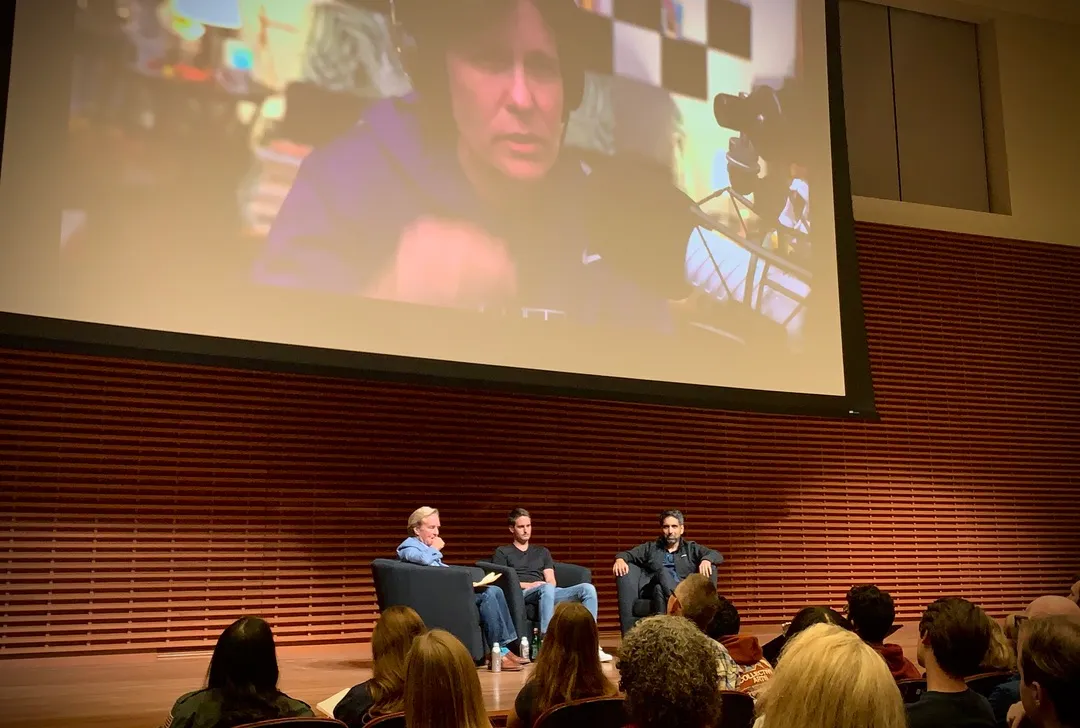The founder-chief executives of Khan Academy and Snapchat parent company Snap Inc. said they believe that tech advancements have improved overall quality of life in America, despite the complex impacts of technology and AI on democracy.
Sal Khan and Evan Spiegel ’18, joined by tech journalist Kara Swisher over Zoom, spoke in CEMEX Auditorium in a Monday panel for the speaker series course “Election 2024: Democracy on the Ballot.” Spiegel and Khan depicted the advancement of technology and AI as complicated but having improved quality of life despite harms from misinformation.
Spiegel told the audience “to take a step back and look at what the world was like 250 years ago.” According to him, the U.S. “should be incredibly focused on being the leading technology power in the world.”
“I think, indisputably, technology has had an incredible impact on our lives [and] the world,” he said. “We should be very focused on how our democracy can continue to advance the most cutting edge technologies.”
Spiegel, a product design major while at Stanford, co-founded Snapchat with his Kappa Sigma fraternity brother Bobby Murphy ’10, who is now Snap’s chief technology officer.
Khan said he agreed with Spiegel that “the general arc of history has been a positive one,” pointing to better mass public education, technological productivity and more people entering the middle class compared across centuries.
In early April of this year, Snap released plans for increasing moderation and fact-checking measures for political advertisements this election season, in response to calls for major tech companies to help protect election integrity.
Snap is also partnering with Vote.org to help register voters. Over 80% of Snapchat users are aged 18 or older, with over half of its U.S. users estimated to be Gen Z — a higher proportion compared to that of TikTok (44.7%), Instagram (33.7%) and X (32.6%).
Before the CEMEX talk, Spiegel also spoke in the class “CEE242P: Product Making,” which deconstructs popular technology products with their founders. The 50-minute talk covered Spiegel’s experience building and growing Snapchat. Spiegel ran through the critical decisions that grew the app, specifically highlighting its deliberate camera-first design and the features specialized to target users of family and friends.
During Monday’s election panel, Spiegel said that, on social media and online platforms, eliminating harmful speech outside the scope of the First Amendment will require focus and energy.
“What are internet services’ obligations when they find that sort of content?” he said, referring to disinformation and harmful speech.
Swisher criticized many social media platforms for hiding behind free speech to avoid what she believes is their obligation to enforce restrictions on harmful speech. She advocated for clearer regulations on what behaviors social media companies are liable for, similar to pharmaceutical and airline companies holding responsibility for their products and services.
Adjunct education professor Jim Steyer J.D. ’83, who leads the class, prompted the speakers to suggest solutions to combat misinformation during this election cycle.
For Spiegel, the health of local news is an area of focus. Spiegel said he has taken a personal interest in strengthening local news reporting in the Los Angeles area, where he lives.
“There is just a massive decline in coverage of council meetings, school board meetings, all of these places where you would typically find a lot of journalistic accountability that was driven by local news,” he said. The issue is prevalent across the U.S., which has lost one-third of newspapers since 2005.
Khan — noting his bias — pointed to education. Creating greater accessibility to gain critical thinking skills, he said, is crucial to combating misinformation campaigns during elections. The Khan Academy CEO described working on offering diverse course options for students, such as civics education.
Swisher identified the contrast between parental attitudes toward online and in-person behaviors. “We protect kids offline everywhere, and we under-protect them online,” she said. The issue of social media addiction, which creates more susceptibility to misinformation, is unique in that parents are similarly affected as their children, according to Swisher.
The solution, she said, lies in not trusting the responsibility fully to parents. She supported actions such as classroom phone restrictions and pushing a culture shift akin to the campaigns against cigarette use.
Ben Rosenfeld ’27, who studies data science and education and attended the panel, emphasized the need for responding to rapidly advancing technology. He also pushed back on the speakers’ claims about technology consistently advancing human wellbeing.
“Technology has irreparably changed democracy and especially American elections,” he said. “I think it is a factor that will be ever-present in elections to come, and it’s probably hurt it for the worse. Sensationalism and lies spread faster than ever.”
In the search for answers to technology’s growing harms on democracy, he agreed with Khan that “education is the path forward.”
A previous version of this article misrepresented Evan Spiegel’s class year as 2012, when he in fact did not return to Stanford to earn his degree until 2018. The Daily regrets this error.
